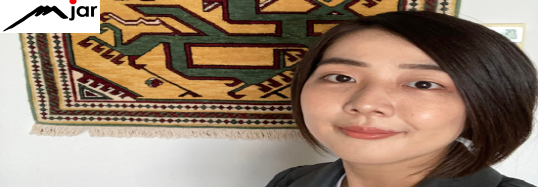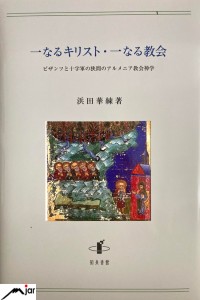
Karen Hamada. “Nerses Shnoralu’s lines were a cure for me…”
My interlocutor, Karen Hamada , is a Japanese theologian . Studied at Tokyo University Regional Studies Department , Graduate School of Arts and Sciences , now works at Tokyo University ( Komaba Campus ). Interested in theological and literary interactions in the Christian East , he studied Armenian , Assyrian and Georgian . This year, Karen Hamada published ” One Christ , One Church . The theology of the Armenian Church between the Byzantines and the Crusaders ” work , which mostly refers to the 12th century Armenian church figure , theologian , poet , composer , Historian , Catholicos of All Armenians , saint of the Armenian Church Nerses Shnorali …
— Dear Karen , first of all let me congratulate you on the publication of your study on Nerses Shnoralu . In fact , it is the first book on the Armenian Apostolic Church that entered the Japanese-speaking world .
- Thank you very much, Arsvi! Fortunately, since I posted the news of my book’s publication on Facebook, I have received many kind messages from friends and strangers alike. To be more precise, a group of Japanese scholars who have studied Armenian church architecture have already published several books in 2019 with very beautiful photographs of Armenian churches, for example, Shiro Sasano’s Pilgrimage to Armenia volume. However, as far as I know, my work is the first book in Japanese about the Armenian Church not as a building, but as a religious tradition of the Armenian people.
— More specifically, what were the responses to your study ?
- There were some reactions on the Internet, positive comments. Since these are just personal opinions, I am now waiting for reviews and reviews from scientific journals, which take time. Although my book is not a bestseller, I can say that the publication of a book on this topic in Japanese has a certain resonance.
- You have also touched on a quite unknown topic: ” Insert Shnoralin in Russian theological literature ” .
- Yes, I studied that topic when I studied at the Russian State Humanities University in Moscow (2009-2010). After some time, I realized that Nerses Shnorali is the first Armenian theologian whose work was completely translated into Russian. Armenian diplomat and translator Alexander Khudabashev translated his “General Document” in 1847, which played an important role in proving the orthodoxy of the Armenian Church, because at that time Russian theologians considered Armenian Christianity a heresy. Since then, I became interested in Nerses Shnorali and tried to read his works, first in translation, then in written originals. I was especially impressed by his work “My oil from the sky and its ornament”. Only some lines from it were translated into Russian during the Soviet years, I found them by chance in the library.
— Do you intend to translate Shnoralu and other medieval Armenian authors into Japanese ?
- I intend to. My book publisher, Chisen Shokan (Japanese for shokan) has already offered to translate Nerses Shnoralu’s theological letters. I also intend to translate the works of other medieval Armenian authors, Grigor Narekatsi and Hovhannes Yerznakatsi, into Japanese. This will be a long term project.
- What can interest the Japanese today in Armenian medieval literature ?
— It depends on people’s interests. Most of the readers of my book are scholars, Byzantine or medievalists. They are interested in medieval Armenian literature because it is a rich source for their subjects of study. However, I believe it will interest even non-scholarly readers, containing emotions and experiences that can be related to the current situation. For example, Nerses Shurali wrote the poem “The Lament of Edesius” to comfort people’s deep sorrow when Edessia was captured by Muslim troops in 1144, and many citizens, including Armenians, were killed or captured. Moreover, Nerses himself became a refugee, fleeing his homeland to Romekla because of the war. When the war started in Artsakh, later in Ukraine, I was so deeply depressed, I was in so much pain,
- Your name Karen has nothing to do with either the Armenian - Persian masculine name or the Anglo - Saxon Karen surname . So what is this name ? _
- It is a difficult question. My name is taken from Hualien, Taiwan. The Japanese use the same Chinese characters as Taiwanese to write the name of the city, but the pronunciation is different. “Hualien” is pronounced “Karen” in Japanese. My father was on a business trip in Hualien when I was born in Japan. He got a phone call about the birth of his baby and his Taiwanese colleagues threw a big party to celebrate my birth. My father was very impressed by their hospitality and, being a little drunk, promised to name the girl after the city. Maybe there is a special relationship between me and hospitable peoples like Taiwanese and Armenians.
— We met ten years ago, first in Yerevan , then in Venice , where you participated in the intensive summer course of Armenian language and culture organized by ” Po - Araks ” association . What are your most memorable memories ?
- “Arriving at Venice in 1816, my mind was in a state which demanded study,” wrote Lord Byron. I also decided to study more about Armenian culture and history during my summer weeks in Venice. For me, a non-Armenian armenologist, it was a really valuable opportunity to learn Western Armenian with skilled teachers, to visit the places of the city that bear the Armenian heritage. What stimulated me the most were the people I met there: teachers, staff, participants and the monks of St. Lazarus. I have many interesting memories and it is difficult to choose the best, but I must say that I was impressed by my experience at St. Lazarus Monastery in Venice. I asked the librarian monk to lend me some books from their library. I was generously allowed not only to read books, but also to use the garden of their monastery for reading. It was a very quiet and peaceful moment. only the sound of the waves could be heard and there was a serene view of the blue sea. And I imagined that many great Armenian scientists did the same here. It was an unforgettable experience.
— Do you see a prospect for further development of Armenian Studies in Japan ?
- It is sad to say that the humanities in Japan are now in a very difficult situation. Many universities are cutting the humanities budget, and my university is no exception. However, as I already mentioned, we can learn a lot from the long and turbulent history of the Armenian people. It is a long process, and the flourishing of a research field will never be possible with the efforts of a few people. However, at least I have already planted a seed and I will take care of it until it sprouts…
the material is taken from azg.am










